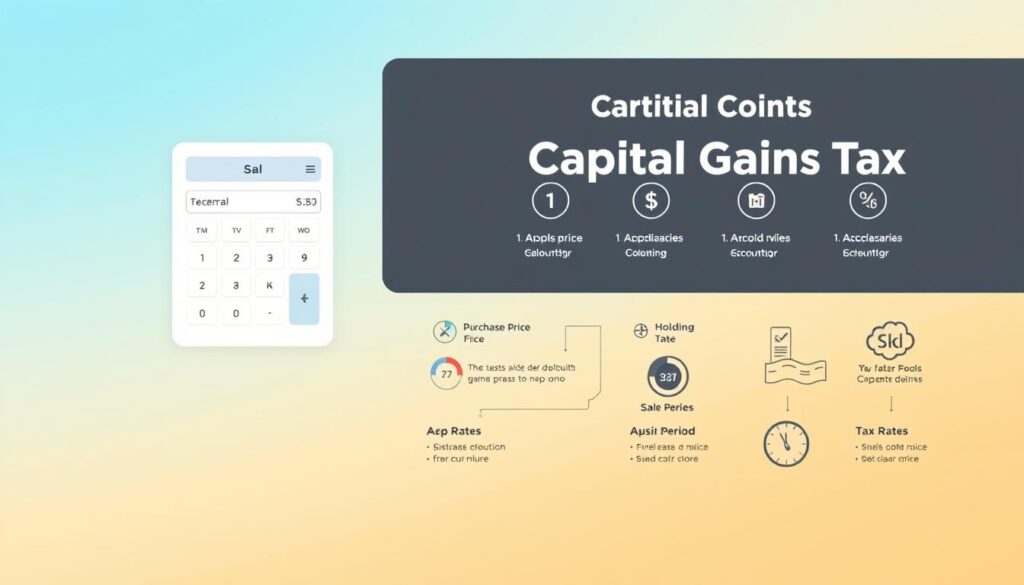Global Real Estate Capital Gains Tax Calculator
Calculate capital gains tax liabilities for property sales in any country worldwide
Property Details
Cost Adjustments
Capital Gains Summary
Tax Breakdown
Tax Savings Opportunities
Select a country to see tax saving strategies.
Advanced Tax Options
Inheritance/Gift Details
Advanced Tax Analysis
Detailed Tax Breakdown
Optimization Recommendations
Use advanced options to get personalized tax optimization recommendations.
Multiple Properties Portfolio
Property 1
Portfolio Tax Summary
Portfolio Optimization
Add multiple properties to analyze tax optimization across your real estate portfolio.
When you sell real estate, knowing about taxes is key. A capital gains tax calculator for real estate helps guess your tax bill.

A capital gains tax calculator (real estate) lets sellers know what taxes they might owe. It looks at the property's buy and sell prices. This way, it figures out the capital gains tax on property.
Key Takeaways
- Estimate tax liabilities when selling real estate.
- Plan finances effectively with a capital gains tax calculator.
- Understand the factors that influence capital gains tax on property.
- Make informed decisions with accurate tax calculations.
- Simplify tax planning with a specialized real estate capital gains tax calculator.
Understanding Capital Gains Tax on Real Estate
When you sell real estate, knowing about capital gains tax is key. This tax is on the profit from selling a property. The rate depends on several things.
What Qualifies as Capital Gains in Real Estate
Capital gains in real estate are profits from selling a property for more than you bought it for. This profit is taxed. To figure it out, you subtract the property's adjusted basis from the sale price.
Short-Term vs. Long-Term Capital Gains
The time you hold the property matters. If sold within a year, it's short-term and taxed like regular income. But, if held over a year, it's long-term. This is taxed at a lower rate, usually 15% or 20%, based on your income.

Current Tax Rates for Real Estate Gains
Long-term capital gains tax rates are 0%, 15%, or 20%. These rates depend on your filing status and income. For example, single filers with income up to $40,400 get the 0% rate. Those with income over $445,850 face the 20% rate. Knowing these rates helps you estimate your tax when selling real estate.
How Capital Gains Tax Calculator (Real Estate) Works
It's important to know how a capital gains tax calculator for real estate works. This tool helps you figure out your tax on real estate deals. It makes a complex process easier.
Components of a Real Estate Capital Gains Calculator
A good capital gains tax calculator has several parts. It includes fields for:
- Purchase price and date
- Improvement costs
- Selling price and expenses
- Depreciation (if applicable)
Online Calculators vs. Manual Calculations
Manual calculations are doable, but online tools are better. They save time and reduce mistakes. They use the right tax rates and rules for you.

Information You'll Need to Gather
To use a capital gains tax calculator well, you need certain documents. These include:
purchase and sale agreements, records of improvements, and depreciation details.
Knowing how a capital gains tax calculator works helps. It lets you estimate your taxes right. This way, you can make smart choices about your real estate.
Step-by-Step Guide: How to Use Capital Gains Tax Calculator (Real Estate)
Using a Capital Gains Tax Calculator for Real Estate is easy once you know how. This guide will show you how to figure out your tax. It's simple and clear.
Entering Your Purchase Information
The first thing to do is enter your purchase details. You need the original price, the purchase date, and any extra costs. This includes closing costs and agent commissions.
Adding Improvement Costs and Selling Expenses
Then, add any improvements you made to the property. This could be renovations or additions. Also, remember to include selling costs like agent fees.
Calculating Your Taxable Gain
After you've entered all the info, the calculator will show your taxable gain. It calculates the sale price minus your adjusted basis.
Adjusting for Depreciation Recapture
If you've taken depreciation deductions, you'll need to add them back. This is called depreciation recapture.
Applying Relevant Tax Rates
Last, the calculator will use the right tax rates for your gain. This depends on your status, income, and how long you owned the property.
| Tax Filing Status | Income Level | Tax Rate |
| Single | $0 - $40,125 | 0% |
| Single | $40,126 - $445,850 | 15% |
| Single | $445,851+ | 20% |
By following these steps and using a Capital Gains Tax Calculator for Real Estate, you can figure out your taxes. This helps you make smart choices about your property.
Key Factors That Affect Your Capital Gains Tax
Many things can change how much capital gains tax you pay on real estate. Knowing these can help you figure out your taxes and make smart choices.
Holding Period Impact
How long you own a property matters a lot. If you own it for over a year, you get long-term capital gains treatment. This means you pay less tax than if you owned it for less than a year.
Cost Basis Adjustments
Changing your cost basis can lower what you owe in taxes. You can add the cost of making your property better and subtract some expenses. A capital gains tax calculator (real estate) can help you figure this out.
State Tax Considerations
State taxes can also affect how much you pay. Some states tax capital gains more than others. You need to think about both federal and state taxes when figuring out your total tax.
| Factor | Impact on Capital Gains Tax |
| Holding Period | Long-term gains are typically taxed at a lower rate |
| Cost Basis Adjustments | Reduces taxable gain by accounting for improvements and expenses |
| State Taxes | Varying state tax rates can increase overall tax liability |
Understanding these factors and using a capital gains calculator can help you guess your taxes better. This way, you can make smarter choices about your real estate.
Tax Exemptions and Exclusions for Real Estate
Real estate investors and homeowners can get tax breaks. These breaks can lower their capital gains tax burden. Knowing about these exemptions is key to paying less tax when selling a property.
One big tax break is the Primary Residence Exclusion.
Primary Residence Exclusion ($250,000/$500,000 Rule)
The Primary Residence Exclusion lets homeowners not pay tax on up to $250,000 ($500,000 for married couples) of capital gains. This is if they lived in the property as their main home for at least two of the five years before selling.
To get this break, the homeowner can't have used it on another property in the last two years. This can greatly reduce or even wipe out the capital gains tax on selling a main home.
1031 Exchanges for Investment Properties
A 1031 exchange lets investors delay paying capital gains tax. They can swap one investment property for another "like-kind" property. This way, they don't have to pay tax on the gain right away, as long as they follow IRS rules.
A 1031 exchange is a great tool for real estate investors. It helps them grow their portfolios or upgrade without paying tax right away.
Special Situations (Inheritance, Divorce, etc.)
Special cases like inheritance or divorce can also affect capital gains tax. For example, inherited properties get a "stepped-up basis" to their value at the time of the owner's death. This can lower capital gains tax when the property is sold.
In divorce, transferring property between spouses is usually tax-free. But, it's important to know the tax effects of such transfers. They can change future capital gains tax liability.
| Exemption/Exclusion | Description | Benefit |
| Primary Residence Exclusion | Exclude up to $250,000 ($500,000 for married couples) of capital gains | Reduces or eliminates capital gains tax on primary residence sale |
| 1031 Exchange | Defer capital gains tax by exchanging investment properties | Defers tax until sale of new property, facilitating investment diversification |
| Inherited Property Stepped-Up Basis | Adjusts basis to fair market value at decedent's death | Potentially reduces capital gains tax on sale of inherited property |
By using these tax breaks, homeowners and investors can cut their capital gains tax. This makes their investments more profitable.
Common Mistakes When Calculating Real Estate Capital Gains
Many real estate investors don't know about common mistakes in capital gains calculation. These mistakes can lead to big tax problems. A capital gains tax calculator guide can help, but knowing the pitfalls is key.
Overlooking Eligible Deductions
One big mistake is ignoring deductions that can lower taxable gains. This includes not counting property improvements or selling costs. A good capital gains calculator should include these to give the right numbers.
Incorrect Basis Calculations
Getting the property's basis wrong is another common error. This can happen if the initial cost is wrong or if improvements and depreciation are not right. Getting the basis right is vital for the correct capital gain.
Misunderstanding Exemption Requirements
Not understanding exemption rules, like the primary residence exclusion, can also cause errors. Knowing how to use capital gains tax calculator means understanding these rules and how they apply to you.
Knowing these mistakes and using the right tools, like a good capital gains calculator, helps investors. They can then accurately figure out their capital gains tax and avoid problems.
Maximizing Your Real Estate Investment with Accurate Tax Calculations
Getting your capital gains tax right is key to making more money from real estate. A capital gains tax calculator (real estate) makes this easier. It helps you make smart choices with your investments.
A capital gains tax calculator looks at many things. It considers how long you held the property, any cost basis changes, and state taxes. This way, it gives you a close estimate of what you'll owe in taxes.
Knowing how to use a capital gains tax calculator well can save you from mistakes. Mistakes like missing out on deductions or getting the basis wrong. It also helps you follow tax rules.
Whether you're experienced or new to selling, a good capital gains tax calculator (real estate) is your ally. It helps you understand and deal with real estate taxes. This way, you can get the best financial results.
Table of Contents
What is a capital gains tax calculator, and how does it work?
A capital gains tax calculator helps figure out taxes on selling a property. It looks at the purchase and sale prices, how long you held it, and tax rates. This helps calculate the taxes you owe.
How do I calculate capital gains tax on real estate?
To find capital gains tax on real estate, first, find the gain by subtracting the adjusted basis from the sale price. Then, apply the tax rate based on your income and how long you held it.
What is the difference between short-term and long-term capital gains tax rates?
Short-term gains are taxed like regular income. Long-term gains have lower rates, 0%, 15%, or 20%, based on your income. The key is how long you held the property.
Can I use a capital gains tax calculator for investment properties?
Yes, you can use a capital gains tax calculator for investment properties. But remember, depreciation recapture can affect your taxable gain.
How does the primary residence exclusion ($250,000/$500,000 rule) work?
The primary residence exclusion lets homeowners exclude up to $250,000 ($500,000 for married couples) of gains from taxes. You must have lived in the property as your main home for at least two of the last five years.
What is a 1031 exchange, and how can it help reduce capital gains tax?
A 1031 exchange lets you swap one investment property for another without paying capital gains tax right away. This can lower your tax bill.
Are there any state tax considerations when calculating capital gains tax on real estate?
Yes, state taxes can affect capital gains. Some states tax more or less than the federal government. Always check state tax laws when calculating gains.
How can I avoid common mistakes when calculating real estate capital gains?
To avoid mistakes, make sure to calculate your adjusted basis correctly. Consider all deductions and exemptions. A good capital gains tax calculator can also help avoid errors.